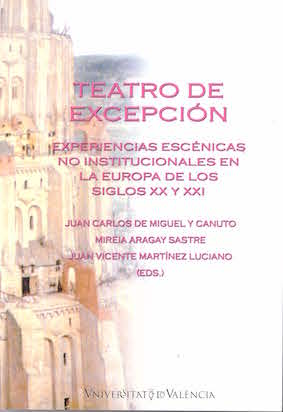El tema hispánico en el teatro universitario ruso
DOI:
https://doi.org/10.7203/qf-elit.v19i0.5211 Resum
Resum
El teatre estudiantil de la Universitat Estatal de Moscou Lomonósov (MGU) es va inaugurar en 1756; avui dia es considera el teatre més antic de Moscou. La nova història del teatre universitari comença en 1983, quan va assumir l'adreça Eugenio Slavutin. En 1999 es va inaugurar el Teatre Obert Estudiantil de Moscou MOST, que significa ‘pont’ en rus. El tema hispànic està representat en diversos espectacles del teatre, basats en les obres postmodernistes de Víktor Korkia com la comèdia d'aventures Armada Invencible, Hamlet.ru i la “novel·la cavalleresca en vers” El Quixot i Sancho Panza a la illa de Taganrog. L'última va servir de base literària per una bufonada filosòfica: El Quixot. Reiniciar la sessió, un diàleg hipnòtic i delirant entre el gentilhome i el seu fidel escuder en una habitació d'hospital. La figura de Quixot sembla un nou Crist, una reencarnació de Hamlet, un etern Maestro de Bulgákov condemnats a no sobreviure mai al món humà.Paraules clau: teatre estudiantil; teatre universitari; teatre-taller; teatre experimental; teatre professional
 Descàrregues
Descàrregues
Descàrregues
Publicades
Com citar
-
Resum262
-
PDF (Español)286
Número
Secció
Llicència
 Este obra está bajo una licencia de Creative Commons Reconocimiento-NoComercial-SinObraDerivada 4.0 Internacional.
Este obra está bajo una licencia de Creative Commons Reconocimiento-NoComercial-SinObraDerivada 4.0 Internacional.
Tots els documents inclosos a OJS són d'accés lliure i propietat dels seus autors i/o institucions editores, i per tant, qualsevol acte de reproducció, comercialització, comunicació pública o transformació total o parcial necessita el consentiment exprés i escrit d'aquests.
________
Authors who publish with this journal agree to the following terms:
- Authors retain copyright and grant the journal right of first publication with the work simultaneously licensed under a Creative Commons Attribution License that allows others to share the work with an acknowledgement of the work's authorship and initial publication in this journal.
- Authors are able to enter into separate, additional contractual arrangements for the non-exclusive distribution of the journal's published version of the work (e.g., post it to an institutional repository or publish it in a book), with an acknowledgement of its initial publication in this journal.
- Authors are permitted and encouraged to post their work online (e.g., in institutional repositories or on their website) prior to and during the submission process, as it can lead to productive exchanges, as well as earlier and greater citation of published work (See The Effect of Open Access).




